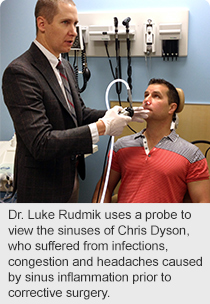
June 23, 2015
Story and photo by Greg Harris
When Chris Dyson had sinus surgery last December, he hoped it would provide some relief from the infections, congestion and headaches he experienced with his chronic sinusitis.
Not only did the surgery help clear up those issues, it also benefited his dog, Astro.
“After the surgery, my sense of taste and smell slowly began to come back,” Dyson says. “One of the first things I noticed was that one of my dogs had really bad breath. It turns out she had an abscessed tooth, which I had taken care of right away.”
 Dyson is among an estimated five to seven per cent of people who live with chronic inflammation of the sinus passageways, a condition that can range from the annoying to the disabling.
Dyson is among an estimated five to seven per cent of people who live with chronic inflammation of the sinus passageways, a condition that can range from the annoying to the disabling.
“People with chronic sinusitis are often all too familiar with having their condition downplayed as simply a stuffy nose,” says Dr. Luke Rudmik, an ear, nose and throat specialist who performed Dyson’s surgery.
“But for many, chronic sinusitis is just as debilitating as asthma and can severely impact their quality of life. It can take away the sense of smell and taste, make sleeping difficult, cause severe fatigue, and eventually lead to depression.”
In a paper recently published in the Journal of Otolarynology - Head and Neck Surgery, Dr. Rudmik found that chronic sinusitis has significantly less research dedicated to it compared to asthma and diabetes, which are two conditions with roughly the same prevalence as sinusitis.
For example, internationally there is about four times the research devoted to asthma and 10 times the research devoted to diabetes as there is to chronic sinusitis.
The causes of chronic sinusitis aren’t well understood but they’re thought to include environmental, immunological, genetic and bacterial factors.
Treatment options range from topical sprays and rinses, to antibiotics and oral steroids, depending on the severity. There is no known cure, although endoscopic sinus surgery can offer significant improvement for many patients when other treatments aren’t effective. During surgery, the physician enlarges the passageways connecting the sinuses to the nose.
“For the most severe cases, surgery can allow physicians to better treat the chronic inflammation which can lead to dramatic improvements in people’s quality of life,” Dr. Rudmik says.
Dyson still takes medication after his surgery but says that, overall, he feels great.
“I can go skiing now and not get the kind of pressure headaches I would usually get at higher altitudes,” he says.
“Everything tastes a lot better, too – I’ve put on weight.”